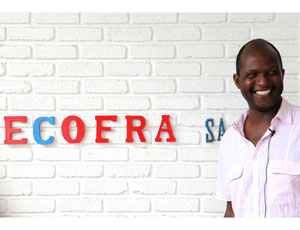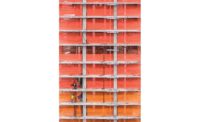Yves François is a firm owner who defies convention. The 45-year-old designer was born in Haiti but spent most of his childhood in Brooklyn. In 1986, he earned an architecture degree from the New York Institute of Technology and went on to work for 10 years at Pepsico as a facility manager and architectural consultant. He later held similar positions at Philip Morris and Cablevision.

In 2004, after nearly two decades working in corporate America, François started re-evaluating his life. “You finally reach a threshold. There’s got to be more to life than making a six-figure salary,” he says. In addition to foutnding a Brooklyn-based development company that specializes in rehabilitating old properties, François began focusing his energy on Haiti.
In 2006, he started donating money to a school in Jacmel, a coastal town, and took steps to establish an architecture and construction firm in Port-au-Prince. In early 2009, he made the bold decision to fully relocate to Haiti, to see if he could “make a difference” in creating a safer built environment. The move surprised his family. “They thought I was crazy,” he says. “I still believe it was the right thing to do.”
Post-earthquake, François continues to operate his firm, dubbed ECOFRA (derived from his children’s names, Erin and Chandler). He also is working as a consultant for Architecture for Humanity, which opened a Haiti office in March. We recently spoke to François about practicing architecture in Haiti, dealing with corruption and how he is playing a role in the reconstruction effort. François spoke with McGraw-Hill Construction Deputy News Director Jenna McKnight.
How many people work for ECOFRA?
I have a professional staff of 10 to 12. Because of the construction projects we do, I sometimes employ upward of 100 people.
What is the role of the “architect” in Haiti?
I’ve never been called an architect. They call me an engineer. The word “architect” is not in their vocabulary. I’m trying to educate people.
What does it take to set up a firm in Haiti?
When I first came down, I didn’t know anything from a business point of view. I made a lot of mistakes and lost a lot of money.
Then I realized it’s not that complicated. You go to the government tax office, file a business certificate and get your tax ID number, which is like an EIN [U.S. Employer Identification Number]. It takes about six months.
Do you pay taxes?
Yes, but the majority [of people] don’t. People ask why I pay taxes, but I’m an American.
Can foreigners set up a company in Haiti?
Yes, absolutely. There are tons of them here. NGOs [non-governmental organizations] have to register, too, but many operate without it, as they don’t have the infrastructure to get everybody registered.
How do you get commissions?
Word of mouth. With a U.S. education, it’s a lot easier.
Do you work on government projects?
Very few. Most of my work now is through international organizations and friends who are well off. Government work is possible, but so far I’ve stayed away. It’s something I’m going to look into, especially because most of the work is being funded by international organizations. Hopefully, it will be a level playing field. RFPs are advertised in the newspaper [and] knowing someone on the inside helps.
I hear there’s a lot of corruption in Haiti. Is that something you encounter?
Every day. I keep telling them, “No, no, I don’t operate like that.” For example, I import construction materials and...


Post a comment to this article
Report Abusive Comment